|
|
|
Sort Order |
|
|
|
Items / Page
|
|
|
|
|
|
|
| Srl | Item |
| 1 |
ID:
189247
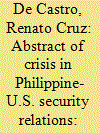

|
|
|
|
|
| Summary/Abstract |
This article explores the prospect of transforming the Philippine-U.S. alliance into a security partnership. In the past, the Philippines doubted the U.S.’s often-repeated commitment to assist its ally because the 1951 Philippine-U.S. Mutual Defence Treaty (MDT) merely stipulated consultation rather than an automatic armed response in case of an armed conflict. In mid-2011, the Aquino Administration asked for an unequivocal U.S. guarantee to defend the Philippines and its naval/air units deployed in the Spratlys. The Duterte Administration, however, has expressed its uncertainty over America’s willingness to back the Philippines militarily in any confrontation with China over the disputed maritime territory. Early this year, President Rodrigo Duterte commented that an armed clash in the South China Sea would crush the Philippines because the involvement of American forces would make the conflict spiral out of control. This development, along with his decision to abrogate the 1997 Philippine-U.S. Visiting Forces Agreement (VFA), has generated a crisis in the alliance. To avert any break-down in their overall security relations, the two allies can explore the possibility of downgrading their alliance to a security partnership. In conclusion, the article argues that should the Philippines consider this option, it must take into account the following: the consequence of losing the deterrence effect of a defence treaty with the world’s most powerful nation; the impact on Philippine defence spending; on the ongoing Armed Forces of the Philippines’ (AFP’s) modernisation program; and whether or not the Filipino nation will support this move.
|
|
|
|
|
|
|
|
|
|
|
|
|
|
|
|
| 2 |
ID:
091870
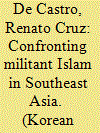

|
|
|
|
|
| Publication |
2009.
|
| Summary/Abstract |
This article discusses the Bush administration's extension of the War on Terror in Southeast Asia and this operation's main objective-the Abu Sayyaf Group (ASG) in the Philippines. It probes the ASG's history, transnational links, and terrorist operations. Then using content analysis, the article analyzes the terrorist group's primary reading material to determine its ideological affiliation with transnational Islamic militant groups. It then argues that the transnational jihadist ideology is evident in the ASG's primary reading material. The material reflects the ideas of the late Palestinian terrorist Abdullah Azzam, and by implication, those of the late Egyptian poet Sayyid Qutb. In conclusion, the article points out that the influence of jihadist ideology on the ASG is superficial, because of the widely held view that the band is a marginalized group operating at the fringes of the mainstream militant Islamic movement in Southeast Asia.
|
|
|
|
|
|
|
|
|
|
|
|
|
|
|
|
| 3 |
ID:
166809
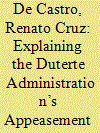

|
|
|
|
|
| Summary/Abstract |
This article examines the reason behind the dramatic shift in Philippine foreign policy under the Duterte Administration. His predecessor, president Benigno Aquino, vigorously challenged China’s expansive territorial claim in the South China Sea throughout his six-year term. However, president Rodrigo Duterte’s actions and pronouncements are undoing the former president’s geopolitical agenda of balancing China’s expansion in the disputed waters. He distances the Philippines from the United States, its long-standing treaty ally, and gravitates toward China. This stance aims to earn goodwill with China so that the Philippines can avail itself of enormous aids and loans from China’s Belt and Road Initiative (BRI). This stemmed from this administration’s fear that the Philippines would not benefit from China’s emergence as an economic power. Nevertheless, by appeasing an expansionist power, the Philippines becomes complicit to China’s long-term strategy of maritime expansion to push the United States out of East Asia. In conclusion, the article warns that the Duterte Administration might end up losing the country’s exclusive economic zone (EEZ) in the South China Sea and the confidence and trust of its allies and security partners. This administration might also leave the public coffers empty and dry because of China’s reneging on its commitment to fund the Philippines’ massive infrastructure-building program, labeled “Build, Build, and Build.”
|
|
|
|
|
|
|
|
|
|
|
|
|
|
|
|
| 4 |
ID:
091105
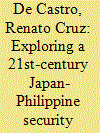

|
|
|
|
|
| Publication |
2009.
|
| Summary/Abstract |
The article examines Tokyo's efforts to link the Philippine and the Japanese security spokes in the face of Beijing's moves to widen the cleavage between both countries' alliances with the U.S. and render them irrelevant. The article concludes that Manila and Tokyo must first reconfigure a defense relationship that is not merely a military aggregation but a political apparatus enabling them to constructively engage an emergent China.
|
|
|
|
|
|
|
|
|
|
|
|
|
|
|
|
| 5 |
ID:
188431
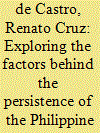

|
|
|
|
|
| Summary/Abstract |
This article examines how the Philippine-U.S. Mutual Defence Treaty (MDT) between the U.S. and the Philippines became the cornerstone of the two countries’ alliance. When the American forces withdrew from their bases in 1992 after the Philippine Senate (by a vote of 12 to 11) rejected the extension of the bases’ stay, the MDT has since served as the fallback basis of the Philippine-U.S. security relationship. However, the MDT does not spell out the details of the U.S. commitment to the Philippine defense. The MDT has been the bone of contention during the first and second decades of the new millennium, especially when China started asserting its expansive claims over much of the South China Sea. Eventually, the two allies made the necessary adjustments to transform the MDT from a mere consultative agreement to the sole bedrock of security relations. In conclusion, the article argues that the Philippines and the U.S. were able to maximize the effectiveness and relevance of their alliance by applying the Goldilocks principle—neither too cold, neither too hot—with the U.S. concretizing its security commitments to the Philippines and the two parties committing themselves together in addressing China’s maritime expansionism cautiously, reliably, and responsibly.
|
|
|
|
|
|
|
|
|
|
|
|
|
|
|
|
| 6 |
ID:
166119
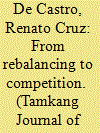

|
|
|
|
|
| Summary/Abstract |
During his two terms as U.S. president, former President Barack Obama made the Asia- Pacific region the focal point of American strategic attention. In November 2011, he announced the U.S. pivot to Asia. His goal was to constrain China from easing out the U.S. as East Asia's strategic offshore balancer. Contrary to expectations, the 2016 election of Donald Trump, did not spell the end of the strategic rebalancing to Asia. For the Trump Administration, the Asia-Pacific remains a top security priority for two reasons. One, North Korea's nuclear weapons program poses a clear and present danger to the U.S. and its allies in Northeast Asia. And two, China's naval expansion, island-building activities, and militarization efforts in the South China Sea threaten not only the freedom of navigation but also the rules-based international order. In conclusion, the article argues that there is a great deal of consistency between the Obama Administration's strategic rebalancing and the Trump Administration's emerging Indo-Pacific Strategy. However, the current administration's Indo-Pacific strategy reflects both continuity as well as discontinuity with its predecessor's rebalancing policy. On the one hand, neither U.S. national security interests nor Asia's importance to Washington has changed in the Trump Administration. On the other hand, its policy also reflects discontinuity as it characterized China as a threat to U.S. interests and is geared to engage this emergent power in a long strategic competition in the Indo-Pacific region.
|
|
|
|
|
|
|
|
|
|
|
|
|
|
|
|
| 7 |
ID:
080293
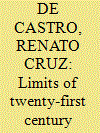

|
|
|
|
|
| Publication |
2007.
|
| Summary/Abstract |
This article examines how China's soft-power diplomacy has dramatically
improved Philippine-China relations, a scenario unthinkable ten years ago. Since
2005, the two countries have significantly increased bilateral trade and investment
relations as well as conducted close and intense security cooperation. Such
developments in bilateral relations have been initiated by China to serve its changing
strategic interests in Southeast Asia. Arguably, the general improvement in
Philippine-China bilateral relations is part and parcel of China's efforts to shape
Southeast Asia's view of its emergence and to apply soft power to erode American
strategic preponderance and influence in the region. However, despite its growing
economic and political ties with Beijing, Manila has not totally succumbed to China's
soft-power diplomacy. Instead of jumping on the Chinese bandwagon, the
Philippines continues to foster closer political/security ties with the United States and
Japan to balance China's growing political and economic clout in Southeast Asia
|
|
|
|
|
|
|
|
|
|
|
|
|
|
|
|
| 8 |
ID:
069204
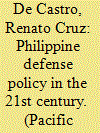

|
|
|
| 9 |
ID:
147057
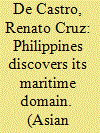

|
|
|
|
|
| Summary/Abstract |
With China’s naval expansion in the South China Sea, the Philippine government has eased up its counter-insurgency/counter-terrorism campaign and has vigorously pursued instead the modernization of the Armed Forces of the Philippines (AFP) particularly in developing the deterrence capability of the Philippine Navy (PN). However, slow-paced and hampered by scant resources, the naval build-up will hardly deter China’s encroachment on the Philippine maritime territory. Faced with this predicament, the Philippines has resorted to forging new security partnerships with the United States and Japan, two major naval powers in East Asia. The paper concludes that maritime security will remain the Philippines’ priority concern way into the third decade of the 21st century.
|
|
|
|
|
|
|
|
|
|
|
|
|
|
|
|
| 10 |
ID:
186532
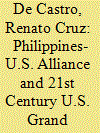

|
|
|
|
|
| Summary/Abstract |
This article situates the Philippines-U.S. alliance within the changing U.S. grand strategies from Barrack Obama’s rebalancing to Asia to President Joe Biden’s continuance of the Trump Administration’s strategic competition with China. Upon President Obama’s announcement of the rebalancing policy in 2011, the Philippines already figured prominently in the American security agenda in Asia, particularly with the intensification of the Philippines-China territorial dispute in the South China Sea. In 2016, President Rodrigo Duterte effected a major shift in Philippine foreign policy by distancing the country from the U.S. and gravitating toward China. The Trump Administration, however, saw the Philippines as a crucial ally in its geostrategic competition with China. Consequently, Washington adopted a policy of strategic patience to bring Duterte onside the U.S. rather than pushing him to China’s embrace. This scheme stabilized the two countries’ security relations and ensured the Philippines’ commitment to the U.S. system of bilateral alliances. In conclusion, the article argues that given the Philippines’ close security ties with the U.S. that often clash with China’s strategic interests and close Philippines-China diplomatic/economic relations, it will be difficult and challenging for President Duterte to pursue an independent foreign policy.
|
|
|
|
|
|
|
|
|
|
|
|
|
|
|
|
| 11 |
ID:
057388
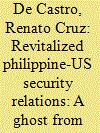

|
|
|
| 12 |
ID:
101630
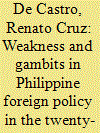

|
|
|
|
|
| Publication |
2010.
|
| Summary/Abstract |
How do resource-starved weak powers adjust to a changing regional system? Looking at the Philippine case, this article examines the direction of the country's foreign policy under the Arroyo administration. Observably, this foreign policy is directed to the generation of external resources that could address the country's main security challenge: domestic insurgencies. To pursue this internal agenda, the Philippines engages both the United States and China in a delicate balancing act. The government has also jump-started its program of development diplomacy, with directives for its embassies and consulates abroad to promote the country's export trade and to protect the rights and welfare of 8.5 million overseas Filipino workers (OFWs). It also utilizes multilateral organizations to advance its national development objectives. However, the country's inherent weakness has constrained its ability to exploit optimally the opportunities created by its fluid external environment. In conclusion, the article contends that unless it consolidates its political base and enhances its economic competitiveness, the Philippines will remain a quintessential weak power in the world of the strong in East Asia.
|
|
|
|
|
|
|
|
|
|
|
|
|
|
|
|
|
|
|
|
|